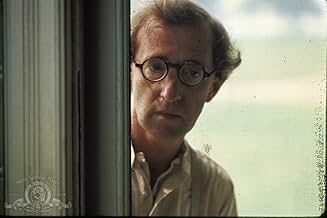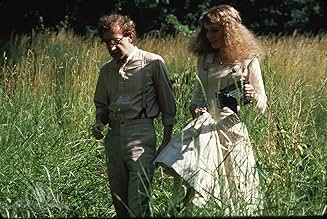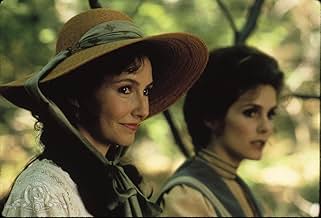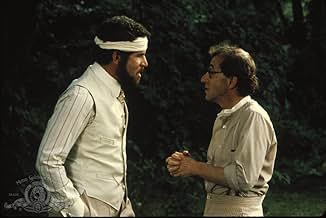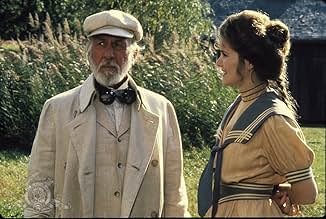CALIFICACIÓN DE IMDb
6.6/10
21 k
TU CALIFICACIÓN
A principios del siglo XX, Andrew Hobbs y su esposa Adrian invitan a otras dos parejas a una fiesta de fin de semana en su romántica casa de verano en el campo en este canto a Sonrisas de un... Leer todoA principios del siglo XX, Andrew Hobbs y su esposa Adrian invitan a otras dos parejas a una fiesta de fin de semana en su romántica casa de verano en el campo en este canto a Sonrisas de una noche de verano de Ingmar Bergman.A principios del siglo XX, Andrew Hobbs y su esposa Adrian invitan a otras dos parejas a una fiesta de fin de semana en su romántica casa de verano en el campo en este canto a Sonrisas de una noche de verano de Ingmar Bergman.
- Dirección
- Guionista
- Elenco
- Premios
- 1 nominación en total
José Ferrer
- Leopold
- (as Jose Ferrer)
Sandy Biano
- Nurse
- (sin créditos)
Caitlin O'Heaney
- Dolores Farrar
- (sin créditos)
- Dirección
- Guionista
- Todo el elenco y el equipo
- Producción, taquilla y más en IMDbPro
Opiniones destacadas
When I saw this film I thought it was from Allen's early period and I thought of it as a prototype Manhattan but when I checked the chronology I discovered that it belongs to his middle period and postdates both Annie Hall and Manhattan. It really is like Manhattan set in the woods of New England. As far as I can see, it is his first film with Mia Farrow and his camera is besotted with her as are all the male characters in the film. Mary Steeburgen also looks good although I can never work out whether she really can act or whether she is just having trouble with her contact lenses. The scenes of New England are beautifully shot and are ravishing to look at. I thought the element of mysticism sat uneasily with the rest of the film.
This film is said to be Allen's take on the Bergman film Three Smiles of a Summer Night although I cannot comment on this because I last saw the Bergman film 35 years ago at a student film society. Maybe the mystical element in Allen's film is lifted from Bergman. There are also obvious parallels with A Midsummer Night's Dream with the mortals swapping partners and with spirits flitting about in the woods. In keeping with the subject matter, Allen uses Mendelssohn for the incidental music rather that his usual classic jazz numbers.
This film is said to be Allen's take on the Bergman film Three Smiles of a Summer Night although I cannot comment on this because I last saw the Bergman film 35 years ago at a student film society. Maybe the mystical element in Allen's film is lifted from Bergman. There are also obvious parallels with A Midsummer Night's Dream with the mortals swapping partners and with spirits flitting about in the woods. In keeping with the subject matter, Allen uses Mendelssohn for the incidental music rather that his usual classic jazz numbers.
Woody Allen's "Midsummer Night's Sex Comedy" that was made in 1982 between "Stardust Memory" (1980) and "Zelig"(1983) is considered by many as a lesser Allen's work or even failure. It was even nominated for a Razzie (Mia Farrow) for crying out loud. Well, failure or not, I'd take this silly, funny, humorous, beautifully photographed with Felix Mendelssohn's Symphony No. 3, Violin Concerto in E Minor, Piano Concerto No. 2 and "A Midsummer Night's Dream" suite for the soundtrack little treasure over the majority of Hollywood comedies any day or night including midsummer night. Spoofing Shakespeare's classic comedy and highly successful Ingmar Bergman's "Smiles of a Summer Night", Woody made a light comedy about six very different people - three couples in a turn-of-the-century who gathered together in a country during the weekend party in search for love, understanding and meaning of life and death which has his own unique style. Allen does not take things too seriously and laughs at and with his characters providing the best comical scenes in the movie as an inventor. One scene is his first appearance with the wings on his back when he tries to fly and another when he pedals his flying bicycle in a very ET - manner. Funny and memorable.
7.5/10
7.5/10
When I look at his filmography on this site and count the films I consider great from the 70s till the early 90s I only stumble over two or three entries I am not fond of. Granted, some are greater than others, but Woody Allen essentially created consistently excellent films for two decades. Whether comedy or drama, whether set in New York or elsewhere, his films are not only great American films, but they belong in the international arena of film art.
Having said all that, and hopefully having disclosed my own bias in discussing the man's work, I can say without further ado that I loved "A Midsummer Night's Sex Comedy." It is hardly the type of Woody Allen film that would receive dozens of critical accolades and nominations (in fact it was only nominated for a Razzie), but I think that can be explained by the fact that Woody Allen set a bar of expectation for himself. When you watch "Manhattan" or "Crimes and Misdemeanors" and then this you see a change of pace, a sort of lighter tone. That does not, however, mean that this film is without its merits. Taken strictly as a film, not as a Woody Allen film, it is plain wonderful. I think that goes for most of his films (except maybe some of the more recent ones).
Allen, of course, is up to his usual tricks again - he takes a Bergman film ("Smiles of a Summer Night") and spoofs it, makes it his own and I think successfully. The atmosphere of this film is what makes it so watchable - the beautiful blend of humor, nostalgia and unfulfilled desire, which I think he perfected in "Radio Days," come through exquisitely. It's also an interesting move away from the stark atheism, or at least agnosticism of his earlier films - the presence of spirits, shadows and ghosts, things unexplained by science, unaccounted for by our sentient experience.
The most interesting aspect of it is that this mystical theme is hardly incongruous with Allen's other films, including his tragedies. Whether his films underline the hopelessness of existence (like "Interiors") or the mystical, and thus hopeful nature of human relationships, they only differ by the mood the storyteller is in when he speaks of them.
Here we have an entirely Shakespearean comedy full of criss-crossing love affairs, absurd relations, untamed desires all leading to hilarious revelations, or serious revelations under the most comic circumstances. Jose Ferrer is remarkable as Professor Leopold, a cold, atheistic intellectual, an accomplished thinker and professor. Contrary to his character, Allen bestows him with some of the funniest lines in the entire film. For example, when he realizes that his marriage to Mia Farrow's Ariel will be the end of his bachelorhood and that he is attracted to Julie Hagerty's nurse Dulcy, he attempts to compliment Dulcy over a game of chess. He says: "You have a wonderful flair for spatial relationships." These little speeches are completely in line with the comic absurdity of the whole, like Tony Robert's Maxwell, a romantic doctor who, gets shot not once, but twice in the film (once for love and once for revenge {meant for someone else}, nonetheless), or Woody Allen's stockbroker / inventor Andrew.
There is such joy in this film, such passion. Yes, maybe "Radio Days" is more articulate and personal on the subject, maybe "Crimes and Misdemeanors" is one of his best tragedies, "Manhattan" one of my favorite of his films along with "Hannah and Her Sisters" and "Another Woman." And, while "A Midsummer Night's Sex Comedy" is not as great, in my humble opinion, as the aforementioned films, it is still a great film, if that makes any sense.
Having said all that, and hopefully having disclosed my own bias in discussing the man's work, I can say without further ado that I loved "A Midsummer Night's Sex Comedy." It is hardly the type of Woody Allen film that would receive dozens of critical accolades and nominations (in fact it was only nominated for a Razzie), but I think that can be explained by the fact that Woody Allen set a bar of expectation for himself. When you watch "Manhattan" or "Crimes and Misdemeanors" and then this you see a change of pace, a sort of lighter tone. That does not, however, mean that this film is without its merits. Taken strictly as a film, not as a Woody Allen film, it is plain wonderful. I think that goes for most of his films (except maybe some of the more recent ones).
Allen, of course, is up to his usual tricks again - he takes a Bergman film ("Smiles of a Summer Night") and spoofs it, makes it his own and I think successfully. The atmosphere of this film is what makes it so watchable - the beautiful blend of humor, nostalgia and unfulfilled desire, which I think he perfected in "Radio Days," come through exquisitely. It's also an interesting move away from the stark atheism, or at least agnosticism of his earlier films - the presence of spirits, shadows and ghosts, things unexplained by science, unaccounted for by our sentient experience.
The most interesting aspect of it is that this mystical theme is hardly incongruous with Allen's other films, including his tragedies. Whether his films underline the hopelessness of existence (like "Interiors") or the mystical, and thus hopeful nature of human relationships, they only differ by the mood the storyteller is in when he speaks of them.
Here we have an entirely Shakespearean comedy full of criss-crossing love affairs, absurd relations, untamed desires all leading to hilarious revelations, or serious revelations under the most comic circumstances. Jose Ferrer is remarkable as Professor Leopold, a cold, atheistic intellectual, an accomplished thinker and professor. Contrary to his character, Allen bestows him with some of the funniest lines in the entire film. For example, when he realizes that his marriage to Mia Farrow's Ariel will be the end of his bachelorhood and that he is attracted to Julie Hagerty's nurse Dulcy, he attempts to compliment Dulcy over a game of chess. He says: "You have a wonderful flair for spatial relationships." These little speeches are completely in line with the comic absurdity of the whole, like Tony Robert's Maxwell, a romantic doctor who, gets shot not once, but twice in the film (once for love and once for revenge {meant for someone else}, nonetheless), or Woody Allen's stockbroker / inventor Andrew.
There is such joy in this film, such passion. Yes, maybe "Radio Days" is more articulate and personal on the subject, maybe "Crimes and Misdemeanors" is one of his best tragedies, "Manhattan" one of my favorite of his films along with "Hannah and Her Sisters" and "Another Woman." And, while "A Midsummer Night's Sex Comedy" is not as great, in my humble opinion, as the aforementioned films, it is still a great film, if that makes any sense.
Cute and charming, if not really much more.
Gordon Willis's photography is nowhere near as amazing as his earlier collaborations with Woody, and the film doesn't have any wildly funny moments.
But the writing is witty, and the acting solid if not triumphant. It just doesn't feel like a Woody Allen film somehow. More like a nice, solid, unassuming French farce.
That's not a bad thing, and this film is still better than 99% of what comes out of Hollywood, with a sweeter, more upbeat tone than usual for Allen. It's just coming on the heels of masterpieces like 'Annie Hall', 'Manhattan', and 'Stardust Memories', and just before other great films like 'Zelig' and 'Purple Rose of Cairo', it can't help but pale a bit in comparison.
Gordon Willis's photography is nowhere near as amazing as his earlier collaborations with Woody, and the film doesn't have any wildly funny moments.
But the writing is witty, and the acting solid if not triumphant. It just doesn't feel like a Woody Allen film somehow. More like a nice, solid, unassuming French farce.
That's not a bad thing, and this film is still better than 99% of what comes out of Hollywood, with a sweeter, more upbeat tone than usual for Allen. It's just coming on the heels of masterpieces like 'Annie Hall', 'Manhattan', and 'Stardust Memories', and just before other great films like 'Zelig' and 'Purple Rose of Cairo', it can't help but pale a bit in comparison.
I am amazed at how neglected this film is. It is a real gem. I'm a big Woody Allen film and I consider it one of his best. The story is intelligent, well-written, funny, and charming. The themes of love, fate, and immortality are explored in a thoroughly entertaining way. A great performance by all the actors, but special mention should be made of Jose Ferrer and Julie Haggerty. See this movie. You will not be disappointed.
¿Sabías que…?
- TriviaJosé Ferrer found himself the object of a practical joke while making this film. Dustin Hoffman visited the set while made up as Dorothy Michaels in the film Tootsie (1982), and proceeded to make sexual advances on Ferrer, who politely refused--but was completely unaware that Hoffman was not in fact a woman.
- ErroresAbout thirteen minutes into the movie, a crew member is visible crouched by a tree, as a deer runs through the woods.
- Bandas sonorasSymphony No. 3 (Scottish) in A Minor
Written by Felix Mendelssohn (as Mendelssohn)
Performed by Leonard Bernstein and the New York Philharmonic (as New York Philharmonic Orchestra)
Courtesy of CBS Records
Selecciones populares
Inicia sesión para calificar y agrega a la lista de videos para obtener recomendaciones personalizadas
- How long is A Midsummer Night's Sex Comedy?Con tecnología de Alexa
Detalles
- Fecha de lanzamiento
- País de origen
- Idiomas
- También se conoce como
- Comedia sexual de una noche de verano
- Locaciones de filmación
- Productoras
- Ver más créditos de la compañía en IMDbPro
Taquilla
- Total en EE. UU. y Canadá
- USD 9,077,269
- Fin de semana de estreno en EE. UU. y Canadá
- USD 2,514,478
- 18 jul 1982
- Total a nivel mundial
- USD 9,077,269
Contribuir a esta página
Sugiere una edición o agrega el contenido que falta

Principales brechas de datos
What is the Brazilian Portuguese language plot outline for Comedia sexual en una noche de verano (1982)?
Responda


